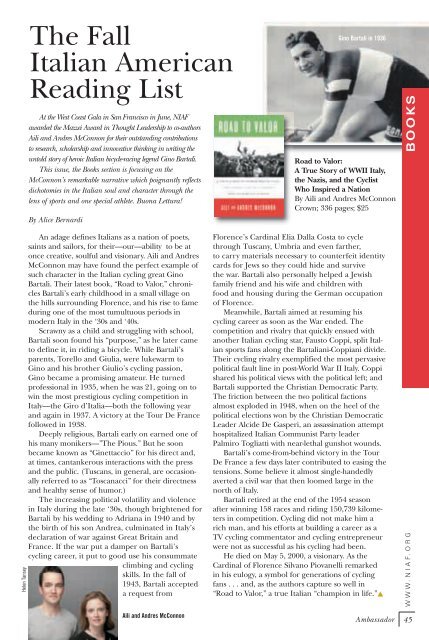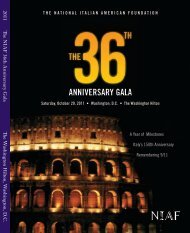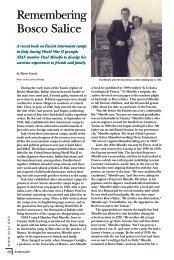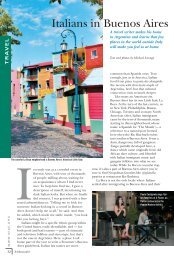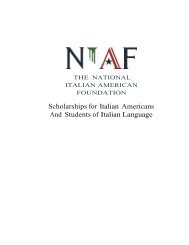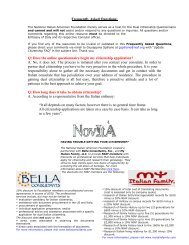Ambassador - National Italian American Foundation
Ambassador - National Italian American Foundation
Ambassador - National Italian American Foundation
You also want an ePaper? Increase the reach of your titles
YUMPU automatically turns print PDFs into web optimized ePapers that Google loves.
Helen Tansey<br />
The Fall<br />
<strong>Italian</strong> <strong>American</strong><br />
Reading List<br />
At the West Coast Gala in San Francisco in June, NIAF<br />
awarded the Mazzei Award in Thought Leadership to co-authors<br />
Aili and Andres McConnon for their outstanding contributions<br />
to research, scholarship and innovative thinking in writing the<br />
untold story of heroic <strong>Italian</strong> bicycle-racing legend Gino Bartali.<br />
This issue, the Books section is focusing on the<br />
McConnon’s remarkable narrative which poignantly reflects<br />
dichotomies in the <strong>Italian</strong> soul and character through the<br />
lens of sports and one special athlete. Buona Lettura!<br />
By Alice Bernardi<br />
An adage defines <strong>Italian</strong>s as a nation of poets,<br />
saints and sailors, for their—our—ability to be at<br />
once creative, soulful and visionary. Aili and Andres<br />
McConnon may have found the perfect example of<br />
such character in the <strong>Italian</strong> cycling great Gino<br />
Bartali. Their latest book, “Road to Valor,” chronicles<br />
Bartali’s early childhood in a small village on<br />
the hills surrounding Florence, and his rise to fame<br />
during one of the most tumultuous periods in<br />
modern Italy in the ‘30s and ‘40s.<br />
Scrawny as a child and struggling with school,<br />
Bartali soon found his “purpose,” as he later came<br />
to define it, in riding a bicycle. While Bartali’s<br />
parents, Torello and Giulia, were lukewarm to<br />
Gino and his brother Giulio’s cycling passion,<br />
Gino became a promising amateur. He turned<br />
professional in 1935, when he was 21, going on to<br />
win the most prestigious cycling competition in<br />
Italy—the Giro d’Italia—both the following year<br />
and again in 1937. A victory at the Tour De France<br />
followed in 1938.<br />
Deeply religious, Bartali early on earned one of<br />
his many monikers—”The Pious.” But he soon<br />
became known as “Ginettaccio” for his direct and,<br />
at times, cantankerous interactions with the press<br />
and the public. (Tuscans, in general, are occasionally<br />
referred to as “Toscanacci” for their directness<br />
and healthy sense of humor.)<br />
The increasing political volatility and violence<br />
in Italy during the late ‘30s, though brightened for<br />
Bartali by his wedding to Adriana in 1940 and by<br />
the birth of his son Andrea, culminated in Italy’s<br />
declaration of war against Great Britain and<br />
France. If the war put a damper on Bartali’s<br />
cycling career, it put to good use his consummate<br />
climbing and cycling<br />
skills. In the fall of<br />
1943, Bartali accepted<br />
a request from<br />
Aili and Andres McConnon<br />
Gino Bartali in 1936<br />
Road to Valor:<br />
A True Story of WWII Italy,<br />
the Nazis, and the Cyclist<br />
Who Inspired a Nation<br />
By Aili and Andres McConnon<br />
Crown; 336 pages; $25<br />
Florence’s Cardinal Elia Dalla Costa to cycle<br />
through Tuscany, Umbria and even farther,<br />
to carry materials necessary to counterfeit identity<br />
cards for Jews so they could hide and survive<br />
the war. Bartali also personally helped a Jewish<br />
family friend and his wife and children with<br />
food and housing during the German occupation<br />
of Florence.<br />
Meanwhile, Bartali aimed at resuming his<br />
cycling career as soon as the War ended. The<br />
competition and rivalry that quickly ensued with<br />
another <strong>Italian</strong> cycling star, Fausto Coppi, split <strong>Italian</strong><br />
sports fans along the Bartaliani-Coppiani divide.<br />
Their cycling rivalry exemplified the most pervasive<br />
political fault line in post-World War II Italy. Coppi<br />
shared his political views with the political left; and<br />
Bartali supported the Christian Democratic Party.<br />
The friction between the two political factions<br />
almost exploded in 1948, when on the heel of the<br />
political elections won by the Christian Democratic<br />
Leader Alcide De Gasperi, an assassination attempt<br />
hospitalized <strong>Italian</strong> Communist Party leader<br />
Palmiro Togliatti with near-lethal gunshot wounds.<br />
Bartali’s come-from-behind victory in the Tour<br />
De France a few days later contributed to easing the<br />
tensions. Some believe it almost single-handedly<br />
averted a civil war that then loomed large in the<br />
north of Italy.<br />
Bartali retired at the end of the 1954 season<br />
after winning 158 races and riding 150,739 kilometers<br />
in competition. Cycling did not make him a<br />
rich man, and his efforts at building a career as a<br />
TV cycling commentator and cycling entrepreneur<br />
were not as successful as his cycling had been.<br />
He died on May 5, 2000, a visionary. As the<br />
Cardinal of Florence Silvano Piovanelli remarked<br />
in his eulogy, a symbol for generations of cycling<br />
fans . . . and, as the authors capture so well in<br />
“Road to Valor,” a true <strong>Italian</strong> “champion in life.”<br />
BOOKS<br />
WWW.NIAF.ORG<br />
<strong>Ambassador</strong> 45


